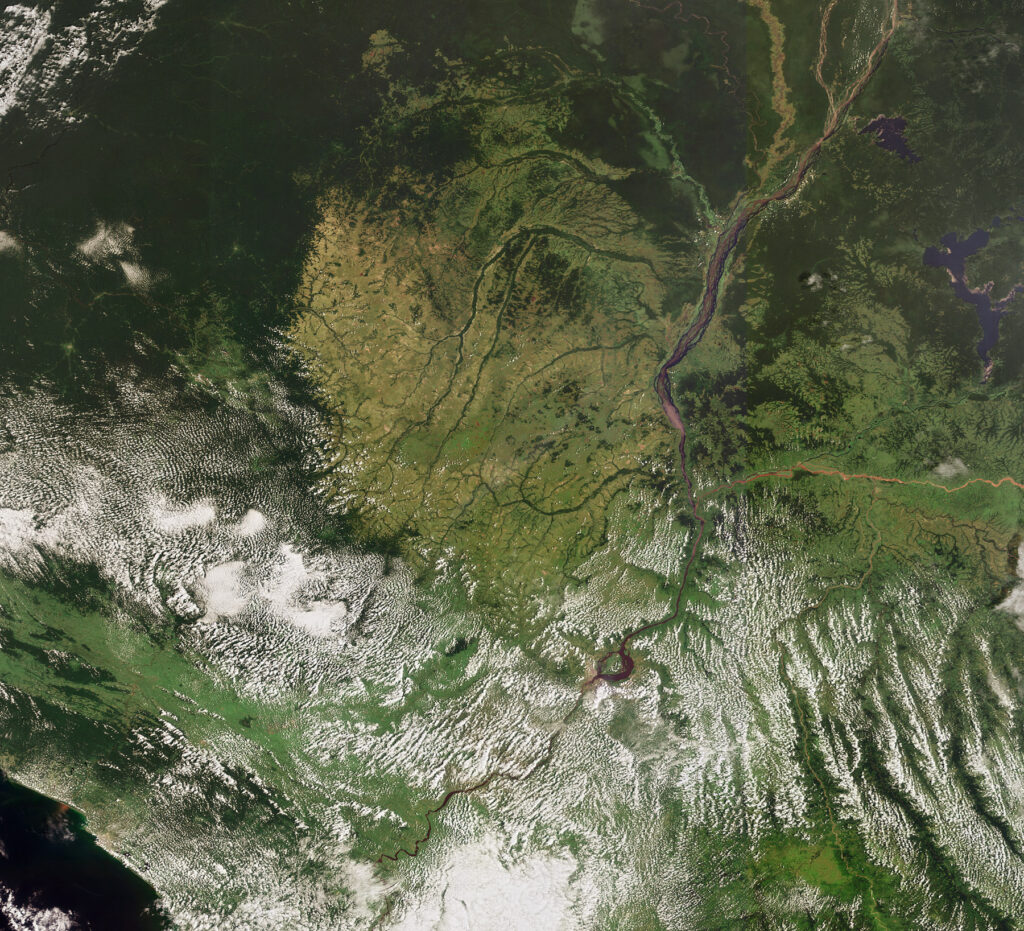Six countries house the Earth’s African lung — Cameroon, Central African Republic, Democratic Republic of the Congo (DRC), Equatorial Guinea, Gabon and Republic of the Congo.
The Congo Basin rainforest in Central Africa is Earth’s African lung. With an area as big as Western Europe, it is the second-largest rainforest in the world. It absorbs 4% of global carbon dioxide emissions every year, offsetting more than the whole African continent’s annual emissions. This represents about 1.1-billion tonnes of carbon dioxide per year — three times the amount emitted by the UK in 2019. The Basin is also Africa’s thermostat as it regulates rainfall patterns, critical to dry areas in the Sahel region and beyond.
Yet researchers are still just discovering amazing facts about it. A recent multicountry study, the first of its kind, has discovered that the Congo Basin is the world’s most resilient rainforest to extreme heat and droughts, extreme weather events caused by El Niño in 2015-2016. Rainforests in West and Central Africa were able to continue to function as carbon sinks. Similar conditions in the Amazon and Borneo rainforests led to a reduction and even a reversal of this capacity.
A complex local context
Six countries house the Earth’s African lung — Cameroon, Central African Republic, Democratic Republic of the Congo (DRC), Equatorial Guinea, Gabon and Republic of the Congo. They are all in Central Africa, many are fossil fuel-dependent, and tend to rank poorly in human development, governance and transparency indices. According to the UN, Central Africa is the worst-off African subregion with the highest concentration of people living below the poverty line on the continent.
The Congo Basin is vulnerable to deforestation mainly from smallholder charcoal production, logging and slush-and-burn agricultural initiatives to meet financial and energy needs. Although its rate of deforestation is lower than that of other rainforests, it has increased significantly over the last two decades. In particular, this is led by the DRC deforestation rate which is second only to that of the Brazilian Amazon. Civil society organisations report that restrictions during Covid-19 led to “a surge” in illegal logging as a source of income by forest communities and indigenous peoples.
Initiatives on the right path but fragmented
Politically, countries of the Congo Basin make the right moves. All of them have committed to protect their rainforests and to reduce their carbon emissions in their nationally determined contributions to the Paris Agreement. All of them participate in international-led programmes to foster the sustainable management of the rainforest, such as the Central African Forest Initiative (CAFI), funded by European countries and the Republic of Korea, and the Central African Regional Program for the Environment, funded by the US.
However, these parallel initiatives, by default, increase the complexity and tensions in an already complicated policy architecture. CAFI’s funding mainly benefits the DRC and Gabon. Recently, Gabon became the first African country to receive results-based payments worth a projected $150-million for curbing its deforestation.
Beyond rainforest conservation
Earth’s African lung will be better served by an integrated regional approach to conservation and mitigation efforts, which must include all the various stakeholder sectors – government, civil society and the private sector – to ensure everyone benefits, especially the most vulnerable.

The Congo Basin Climate Commission, an African-led initiative supported by Morocco, could the right platform, if it can commit to involve all stakeholders, especially civil society groups. Since 2017, the Commission has been trying to raise funds to operationalise the Blue Fund for the Green Economy in Central Africa. Its goal is to raise $8-billion to implement 254 projects. The Fund could harness existing initiatives in the region and build necessary trust among the various actors to ensure forest conservation and the sustainable development of the people in Central Africa.
No forest, no Baka
The Baka people from Southern Cameroon have a saying: “No forest, no Baka.” But the Congo Basin benefits are global. The whole world benefits from the Earth’s African lung. Guaranteeing its protection, requires global commitment to ensure that both the people and nature of Central Africa thrive.
Everyone has a role to play. Regional initiatives should focus on implementation, ensuring transparency and participation. International ones can focus on incentivising collective regional action through results-based payments and supporting the Basin countries’ ability to access environmental markets to trade emission reduction commitments. At the national level, governments must leverage more efficiently the use of relevant existing funds for agriculture, energy and the environment.Over the last 10 years, the Brazilian Amazon released more carbon than it absorbed. As scientists try to establish the durability of these results, at the upcoming UN Climate Change Conference of Parties (COP26) it is critical to spotlight Earth’s African lung. Stakeholders must speak with one voice and demand coordinated support to ensure its conservation. It is in our interest.